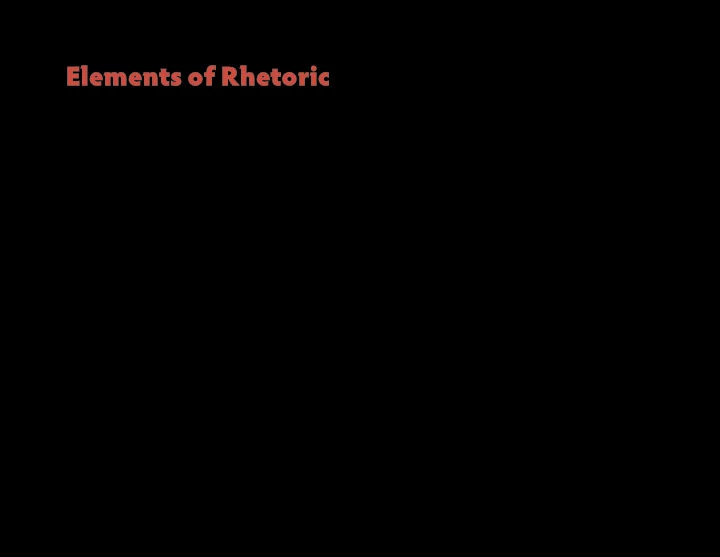

Elements of Rhetoric revised: 06.08.10 | | English 1301: Com position & Rhetoric I || D. Glen Sm ith, instructor
introduction Rhetoric —is the art of using language to communicate effectively and has been a major part of Western education since the Ancient Greeks. revised: 06.08.10 | | English 1301: Com position & Rhetoric I || D. Glen Sm ith, instructor 2
Appeals in Writing Three Types of Appeals Exist These are rhetorical devices used to enhance observations in research papers: A. logos— (rational) B. pathos— (emotional ) C. ethos— (ethical ) These are similar to the different purposes for papers: inform, persuade, speculate, entertain, incite, instigate Of these, the primary purposes for the class assignments will be: inform persuade speculate revised: 06.08.10 | | English 1301: Com position & Rhetoric I || D. Glen Sm ith, instructor 3
Appeals in Writing: Logos All three of these purposes can be merged into one paper; the longer the work, the greater the necessity for multiple intentions. Likewise, just as one essay can fulfi ll multiple purposes, on essay can use multiple appeals; the purpose of the work controls the type of appeal in use. Logos (rational) • Using a rational appeal requires a burden of proof, or claim . Academic writing requires evidence to back up observations. Furthermore, rational appeals utilize different types of claims. revised: 06.08.10 | | English 1301: Com position & Rhetoric I || D. Glen Sm ith, instructor 4
Five Types of Claim s 1. factual claim : declarative sentence that asserts something about a • current reality: Austin is the capital of Texas. • future condition: The US plans to colonize Mars by 2030. • past event: Vikings discovered the New World hundreds of years before Colum bus. 2. value claim : opinion based declarative promoting personal feelings or tastes, detailing preference between two objects, people, situations. The book , Ulysses, is Jam es Joyce strongest, and m ost com plex, novel. revised: 06.08.10 | | English 1301: Com position & Rhetoric I || D. Glen Sm ith, instructor 5
Five Types of Claim s 3. a m oral claim is made on the basis of a perscribed code of values (not necessarily religious): Despite the school board’s intentions, teaching creationism in a high school science class does not offer a w ell-rounded education. 4. causal claim s : asserts and defi nes causes for an event or situation: Slavery w as only one cause of the Am erican Civil War. 5. deliberative claim : a declarative sentence which asserts something should or should not be done. Capital punishm ent is a necessary deterrent to crim e and should continue as a part of Texas’ legal process. revised: 06.08.10 | | English 1301: Com position & Rhetoric I || D. Glen Sm ith, instructor 6
Appeals in Writing: Pathos Pathos (em otional) • When using a persuasive purpose, an emotional appeal works best. • Emotional, personal writing produces a reaction from the audience. • When analyzing an emotional appeal, look carefully at the writer’s emotionally charged words and the nature of their use. • When reading an emotional appeal, be sure to determine: >What emotion is the writer wanting you to feel? >What manner is fi gurative language being used? >Is the audience being manipulated? >Is the emotion consistent with the purpose? >Is the emotion appropriate to the audience, the situation, and the subject? >Is the emotion the dominant part of the essay (which shows a bias) or do rational arguments appear the main focus? >Is the emotional material used to clarify a com plex argum ent . revised: 06.08.10 | | English 1301: Com position & Rhetoric I || D. Glen Sm ith, instructor 7
Appeals in Writing: Ethos Ethos (ethical) • most complicated portion of the rhetorical process • applies to good debate tactics and public speaking. • borders on philosophical approaches to your particular life values • avoidance of plagiarism or theft of another w riter’s ideas. revised: 06.08.10 | | English 1301: Com position & Rhetoric I || D. Glen Sm ith, instructor 8
Essay Writing Modes • Understand the boundaries of the assignm ent: > Date due > Page restrictions / word count > Prompt specifi cations • Determ ine : > purpose > audience > tone > point of view • Again, the primary purpose of the assignments in this class serve to inform, persuade or speculate revised: 06.08.10 | | English 1301: Com position & Rhetoric I || D. Glen Sm ith, instructor 9
Essay Writing Modes • Audience: > primary audience and secondary audience • What information does your audience already know? • What new information will you provide? • What is your audience’s attitude? • Are they sympathetic, neutral, or against your opinion? • What is your audience’s background? The answers to these questions will determ ine: What tone or level of form ality should you use in your essay? When bringing your opinions together, do you want to cite anger in your audience? Do you want to motivate action as a community? revised: 06.08.10 | | English 1301: Com position & Rhetoric I || D. Glen Sm ith, instructor 10
Essay Writing Modes Would a formal or informal tone work best in this situation? • Tone: is emotional states expressed in writing: anger, resentment, over-critical, comical or levels of formal and informal talk 1 2 3 4 5 6 7 8 9 10 academic, formal colloquial, informal research paper personal essay speech chatty/ bar scene revised: 06.08.10 | | English 1301: Com position & Rhetoric I || D. Glen Sm ith, instructor 11
Essay Writing Modes • Points of view rst person: me, myself, I fi m ostly inform al second person : you, yours, your third person: he, she, it m ostly form al revised: 06.08.10 | | English 1301: Com position & Rhetoric I || D. Glen Sm ith, instructor 12
Recommend
More recommend